

Radical Constructivism. Informatique quantique. Un article de Wikipédia, l'encyclopédie libre.
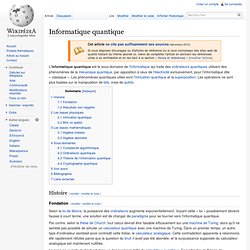
Histoire[modifier | modifier le code] Fondation[modifier | modifier le code] Selon la loi de Moore, la puissance des ordinateurs augmente exponentiellement. Voyant cette « loi » possiblement devenir fausse à court terme, une solution est de changer de paradigme pour se tourner vers l'informatique quantique. Par contre, selon la thèse de Church, tout calcul devrait être faisable efficacement sur une machine de Turing, alors qu'il ne semble pas possible de simuler un calculateur quantique avec une machine de Turing.
La prise en compte du bruit est donc un des premiers défis du calculateur quantique. Résultats non négatifs[modifier | modifier le code] Les problèmes résolus par l'algorithme de Shor n'ont pas de solution efficace connue sur un ordinateur classique, bref, sur une machine de Turing. Les bases physiques[modifier | modifier le code] L'informatique quantique est basée sur la mécanique quantique. Chat de Schrödinger. Un article de Wikipédia, l'encyclopédie libre.
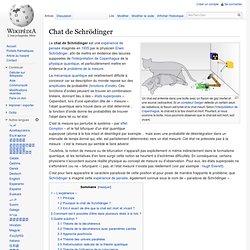
La mécanique quantique est relativement difficile à concevoir car sa description du monde repose sur des amplitudes de probabilité (fonctions d'onde). Ces fonctions d'ondes peuvent se trouver en combinaison linéaire, donnant lieu à des « états superposés ». Evolutionary Ethics. Cybernetic Immortality. Cybernetics - A Definition. © Paul Pangaro, 1990. “Getting Started” Guide to Cybernetics What does the word “cybernetics” mean? “Cybernetics” comes from a Greek word meaning “the art of steering”. Try this introductory video. Cybernetics is about having a goal and taking action to achieve that goal.
Knowing whether you have reached your goal (or at least are getting closer to it) requires “feedback”, a concept that comes from cybernetics. From the Greek, “cybernetics” evolved into Latin as “governor”. When did cybernetics begin? Cybernetics as a process operating in nature has been around for a long time. Cybernetics as a concept in society has been around at least since Plato used it to refer to government. In modern times, the term became widespread because Norbert Wiener wrote a book called “Cybernetics” in 1948. Wiener’s sub-title also states that both animals (biological systems) and machines (non-biological or “artificial” systems) can operate according to cybernetic principles. Videos ViewHuman-machine symbiosis. Interview with Heinz von foerster.
SEHR, volume 4, issue 2: Constructions of the MindUpdated 26 June 1995 interview Stefano Franchi, Güven Güzeldere, and Eric Minch stanford humanities review: The primary goal of this special issue of SHR is to promote a multidisciplinary dialogue on Artificial Intelligence and the humanities.
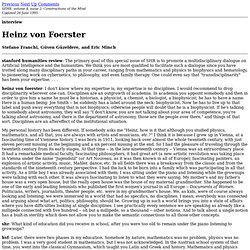
We think you are most qualified to facilitate such a dialogue since you have trotted along many disciplinary paths in your career, ranging from mathematics and physics to biophysics and hematology, to pioneering work on cybernetics, to philosophy, and even family therapy. One could even say that "transdisciplinarity" has been your expertise. . . . heinz von foerster: I don't know where my expertise is; my expertise is no disciplines. My personal history has been different. Ethics and second-order cybernetics. SEHR, volume 4, issue 2: Constructions of the MindUpdated 4 June 1995 Heinz von Foerster Ladies and Gentlemen: I am touched by the generosity of the organizers of this conference, who not only invited me to come to your glorious city of Paris, but also gave me the honor of opening the plenary sessions with my presentation.[1] And I am impressed by the ingenuity of our organizers, who suggested to me the title of my presentation.
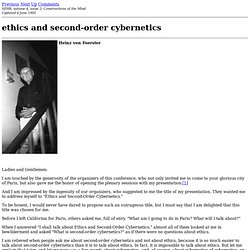
They wanted me to address myself to "Ethics and Second-Order Cybernetics. " To be honest, I would never have dared to propose such an outrageous title, but I must say that I am delighted that this title was chosen for me. Before I left California for Paris, others asked me, full of envy. When I answered "I shall talk about Ethics and Second-Order Cybernetics," almost all of them looked at me in bewilderment and asked "What is second-order cybernetics? " It is this circular organization which sets cybernetic systems apart from others that are not so organized. Why? Or. Imprint Academic. The Heinz von Foerster Page. Cybernetics and Systems Thinkers. Cybernetics.PDF (Objet application/pdf) NORBERT WIENER (1894-1964) Norbert Wiener was born in 1894, on November 26, in Columbia (Missouri).
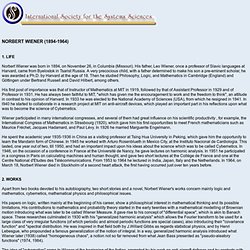
His father, Leo Wiener, once a professor of Slavic languages at Harvard, came from Byelostok in Tsarist Russia. A very precocious child, with a father determined to make his son a pre-eminent scholar, he was awarded a Ph.D. by Harvard at the age of 18. Then he studied Philosophy, Logic, and Mathematics in Cambridge (England) and Göttingen under Bertrand Russell and David Hilbert, among others. His first post of importance was that of Instructor of Mathematics at MIT in 1919, followed by that of Assistant Professor in 1929 and of Professor in 1931.
He has always been faithful to MIT, "which has given me the encouragement to work and the freedom to think", an attitude in contrast to his opinion of Harvard. He spent the academic year 1935-1936 in China as a visiting professor at Tsing Hua University in Peking, which gave him the opportunity to learn the Mandarin form of Chinese. Books Articles. Wiener_Norbert summary.